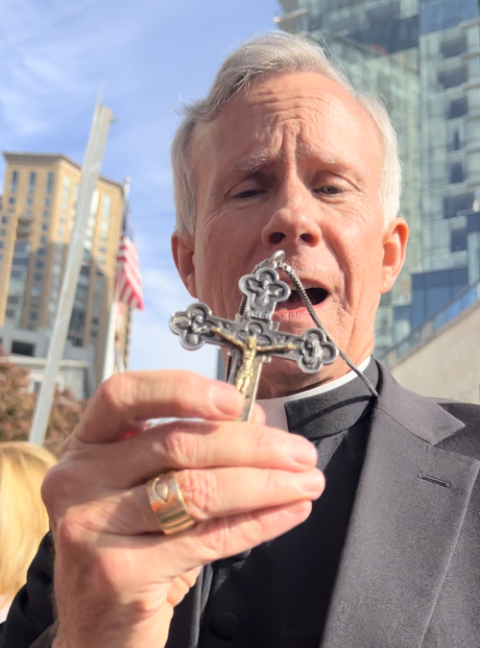Bishop Joseph Strickland's removal from his diocese by Pope Francis has sparked a significant theological debate within the Catholic Church. As a vocal critic of Pope Francis, Strickland's dismissal in 2023 brought to light differing interpretations of church doctrine and leadership styles. This controversy highlights the ongoing dialogue between traditionalist and progressive factions within the Church.
Amidst this theological divide, Strickland's public response to his removal offers a unique perspective on the relationship between bishops and the papacy. His willingness to express gratitude for those who prayed for Pope Francis, despite their differences, reflects a complex interplay of respect and critique. This article delves into the nuances of their theological views and the implications of such disagreements on the broader Catholic community.
In a recent social media post, Bishop Joseph Strickland shared his thoughts following his removal from the Diocese of Tyler, Texas, by Pope Francis. Despite the circumstances, Strickland expressed gratitude for the prayers offered on behalf of the Pope. This gesture underscores a deep-seated commitment to the principles of the Church, even amidst personal challenges. The bishop's reflections provide insight into the dynamics of ecclesiastical authority and the importance of prayerful support within the Catholic tradition.
Theological Perspectives in Conflict
Pope Francis's decision to remove Bishop Joseph Strickland from his position as the head of the Diocese of Tyler, Texas, has ignited discussions about the evolving landscape of Catholic theology. Strickland, known for his conservative stance, often found himself at odds with the more progressive approach advocated by Pope Francis. This divergence in theological perspectives has been evident in various public statements and actions taken by both figures.
The Holy See's announcement regarding Strickland's removal cited no specific reasons, leaving room for speculation among Church observers. Some suggest that Strickland's active presence on social media, where he frequently voiced criticisms of the Pope's policies, may have contributed to the decision. Others point to deeper doctrinal disagreements, particularly concerning issues like liturgical practices and pastoral care, which have become focal points of contention within the Church.
Despite the removal, Strickland maintains a respectful tone towards Pope Francis, emphasizing the need for continued prayer and support for the pontiff. This attitude reflects a broader call within the Church for unity and mutual respect, even when theological differences arise. It also highlights the delicate balance required in maintaining hierarchical structures while fostering open dialogue among Church leaders.
Understanding Leadership Changes
The appointment of Bishop Joe S. Vásquez of Austin as apostolic administrator to oversee the Diocese of Tyler until a new bishop is appointed signifies a strategic move by the Vatican. This transition aims to ensure stability and continuity within the diocese during a period of change. Such administrative decisions are crucial in maintaining the Church's mission and outreach efforts, especially in regions experiencing rapid growth or internal challenges.
Briana Jansky, a member of the Tyler community, shared her experiences under Bishop Strickland's leadership, shedding light on the impact of episcopal governance on local congregations. Her account illustrates how differing approaches to pastoral care can influence individual faith journeys. While some appreciated Strickland's traditionalist views, others felt alienated by what they perceived as rigid interpretations of Church teachings.
This shift in leadership presents an opportunity for reflection on the role of bishops in nurturing spiritual growth and addressing the diverse needs of their flock. It encourages discussions about effective communication strategies and the importance of inclusivity in Church leadership, ensuring that all voices are heard and valued within the Catholic community.
A Legacy of Faith and Controversy
Bishop Joseph Strickland's tenure as the head of the Diocese of Tyler was marked by both dedication to his faith and involvement in controversial debates. His participation in events like the Rome Life Forum, where he supported sedevacantist views questioning Pope Francis's legitimacy, further complicated his standing within the Church hierarchy. These incidents underscore the complexities of balancing personal convictions with institutional loyalty.
Strickland's removal serves as a reminder of the challenges faced by Church leaders in navigating modern issues while upholding traditional values. It raises important questions about the nature of authority and obedience within religious institutions. By examining these dynamics, the Catholic Church can better understand how to foster unity amidst diversity and address the concerns of its global membership.
As the search for a new bishop continues, the Diocese of Tyler looks forward to a future shaped by renewed commitment and collaboration. This period of transition offers a chance to rebuild trust and strengthen ties among parishioners, reaffirming the Church's mission to serve as a beacon of hope and reconciliation in an ever-changing world.

